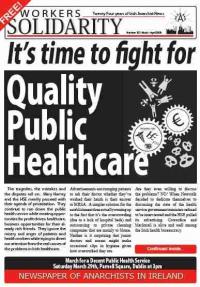Over 30 years of anarchist writing from Ireland listed under hundreds of topics
It’s Time to Fight for Quality Public Healthcare
The tragedies, the mistakes and the disputes roll on. Mary Harney and the HSE merrily proceed with their agenda of privatisation. They continue to run down the public health service while creating opportunities for profit-driven healthcare, business opportunities for their already rich friends. They ignore the misery and anger of patients and health workers while trying to divert our attention from the real causes of the problems in Irish healthcare.Advertisements encouraging patients to ask their doctor whether they've washed their hands is their answer to MRSA. A simpler solution for the establishment than actually owning up to the fact that it's the overcrowding (due to a lack of hospital beds) and outsourcing to private cleaning companies that are mainly to blame. Neither is it surprising that junior doctors and nurses might make occasional slips in hygiene given how overworked they are.
Are they even willing to discuss the problems? NO! When Newstalk decided to dedicate themselves to discussing the state of the health service government ministers refused to be interviewed and the HSE pulled its advertising. Cowardice and blackmail is alive and well among the Irish health bureaucracy.
Creeping privitisation
Meanwhile, the HSE is trying to privatise the ambulance service. Of course, the public ambulance service is seriously under-resourced. The number of ambulances has not increased since 1985, when there were just 20, 000 call-outs, one-fifth of what they are today. Another example of how the public health service has been gradually run-down over the past 30 years.
What's the result of this running down and underfunding? Irish respiratory death rates are the second worst in Europe. Similar statistics are available for various cancers and heart disease.
To challenge this privatisation agenda, the Dublin Council of Trade Unions and the ICTU Youth committee have organised a "Campaign for a Decent Public Health Service". Roughly 300 people attended the launch of the campaign in Liberty Hall, Dublin which included moving contributions by Conor MacLiam (the husband of Susie Long) and Janette Byrne (from Patients Together). The aim of the campaign is to bring together health workers and their trade unions, patient groups, hospital campaigners and the general public to demand a civilised health service.
The next step in building the campaign will be a national demonstration to take place on 29th March, assembling at Parnell Square, Dublin at 3pm.
If you can, try and attend this protest. Why? Because it is time to raise one loud voice against the privatisation agenda of this government. Such a voice, fuelled by the anger of thousands of mistreated patients, victims of the two-tier health service, and by the frustration of thousands of health workers who try their best in a system that is skewed to favour the rich, can send a very clear message. It can send a message that we will no longer be divided between urban and rural, between patient and doctor. We will stand united and demand change. We will gain confidence in hearing and seeing the collective determination of our fellow patients and fellow workers. This is the confidence we will need to build a strong, united and persistent campaign.
Of course, it is not an easy task to build such a campaign. There are a number of fundamentals which need to be met if any campaign is going to be capable of taking on this political elite, as well as the vested interests in the current shambolic system, and fight for free and equal healthcare for all. To be successful the campaign must be:
Beyond the local
For too long campaigns around the health system have been locally based, attempting to save regional services. The problems in the health service affect working people throughout the country, so a campaign for health reform must be carried out nationwide. Local groups need to organise themselves in every major town, in every county in the country.
Beyond parliament
And it is only organised workers, both in trade unions and in local communities, that can win such a campaign. No party in government has tackled this issue since the creation of the state. No elected independent politician has made much of a difference. And even if they had been willing, they couldn’t have. The powerful vested interests, including the health insurance companies, the consultants, the HSE bureaucracy, the royal colleges and medical bodies, have opposed and will oppose the creation of an equitable and accessible system for all. So it is only a strong and united national campaign of trade unions and community groups that can create the required pressure for change and maintain it over a number of years before a comprehensive public health system for all is created.
Beyond partnership
And let’s not be fooled to think such a system will be granted through 'social partnership'. An active health campaign of workers should not be frittered away by the union bureaucracy at the “bargaining table” of national agreements. The rich and powerful will not willingly get rid of our apartheid health system.
Towards a grassroots movement
So let us begin the long process for change. Let us begin to educate ourselves on how the powerful have designed the system to discriminate against working people. Let us collectively come up with the solutions we require. And let us begin to organise, in our workplaces and in our communities, a democratic movement for universal healthcare, from the bottom up
From Workers Solidarity 102 the issue for March & April 2008

PDF of the Ulster edition of Workers Solidarity 102
PDF of the southern edition of Workers Solidarity 102

